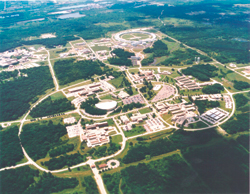 |
|
|
Lab limbo The current administration’s preference for competition means the University must bid on Argonne National Laboratory. After decades of running the nation’s first national laboratory, Argonne—chartered in 1946 as an outgrowth of Enrico Fermi’s Manhattan Project work—the University now must compete for the job. The 2004 energy and water appropriations legislation, signed by President Bush in December, requires Energy Secretary Spencer Abraham to solicit proposals for lab contracts that haven’t been up for bid in more than 50 years.
In late January the Department of Energy (DOE) formally announced plans to open competition on Argonne and four other labs—Ames National Laboratory, operated by Iowa State University, and three run by the University of California: Lawrence Berkeley, Lawrence Livermore, and Los Alamos. At that time the DOE hadn’t yet issued requests for proposals for those labs—or for Argonne’s sister lab, Idaho’s Argonne West, which the University has operated since its 1949 inception. Argonne West, the department said in April 2003, would be combined with the Idaho National Engineering and Environmental Laboratory. The resulting institution, renamed Idaho National Laboratory, will focus on “developing advanced nuclear energy technologies and other ways of responding to the nation’s future energy and national security requirements,” according to a DOE news release. Chicago plans to compete for both contracts, says Thomas F. Rosenbaum, vice president for Argonne, assuming the solicitations include “a strong science component.” Preparing the proposals, he predicts, could cost “millions of dollars” in staff hours, paperwork, and out-of-town meetings, but maintaining the link to the labs, which are “woven into the intellectual fabric of the University,” warrants an aggressive approach. “We’ll do it because of our responsibilities to the science,” says Rosenbaum, who also oversees University research—although, he says, pitting Chicago, a nonprofit, against potential corporate bidders creates “an asymmetric system.” But competition, asymmetric or not, is the government’s aim. As the San Francisco Chronicle declared in a December article about the University of California’s possible three-lab loss: “The effort to force competition for the management of the labs is part of a larger government-wide agenda by the Bush administration to require high-stakes competitions for many contracts and services.” The Chronicle also noted that Los Alamos’s recent fraud allegations, theft scandals, and management failures compromised the lab’s security. Such missteps, Abraham told the Associated Press in December, is one reason “we found it appropriate to go ahead with competition.” The “much-publicized troubles of the University of California,” Rosenbaum admits, “have not helped” Chicago’s situation, increasing political pressure for “competition for the sake of competition” and “besmirching the reputations of universities” as competent lab managers. “We’re in a performance-based contract,” he notes, and have received stellar yearly performance reviews from the DOE. In both the management and the science and technology categories Chicago has earned mostly “outstanding” ratings—the highest possible—and a few “excellents,” garnering close to the $3 million maximum operating fees in each of the last three years. Of those fees, the University reinvests $370,000, often in joint research projects involving Chicago faculty and Argonne scientists. “Unlike a for-profit that would take the fees for shareholder desires,” Rosenbaum explains, “our return on investment is the intellectual capital that we create.” Such collaboration has fostered both “scientific accomplishment and practical applications,” he says, helping the University to “keep, retain, and attract some of the best people in the world.” Chicago’s scientific goals, Rosenbaum adds, coincide with Idaho National Lab’s expressed mission involving energy policy. “We’re about such big problems; we want to be a part of it.” It’s also a matter of tradition, he says, noting that President Don Michael Randel expressed this view in the October/03 Magazine: “Perhaps because we attended its birth,” Randel wrote, “we have a particular responsibility in relation to nuclear energy. Perhaps also we have a moral responsibility to bear our values on an important and complicated set of issues.” To compete for the Illinois and Idaho contracts the University may follow the models that won it two grants last September: $35 million for Argonne to become a Regional Center of Excellence for Biodefense and Emerging Infectious Diseases Research and $17 million to build a Regional Biocontainment Laboratory there. Having a secure, well-equipped site and strong intellectual-science resources, Rosenbaum says, helped the University to win those bids. This time Chicago also may seek a partner, perhaps a company with strong management experience. Officials are already talking with some businesses about teaming up for the Idaho contract, but for the Chicago bid, Rosenbaum says, “we prefer to do it ourselves.” Although Argonne’s current contract expires in September, the delayed appearance of the proposal requests—which may not be published until this summer, some observers say—could mean that the DOE won’t decide on a bidder until after the November elections.—A.M.B.
|
|
phone: 773/702-2163 | fax: 773/702-8836 | uchicago-magazine@uchicago.edu


